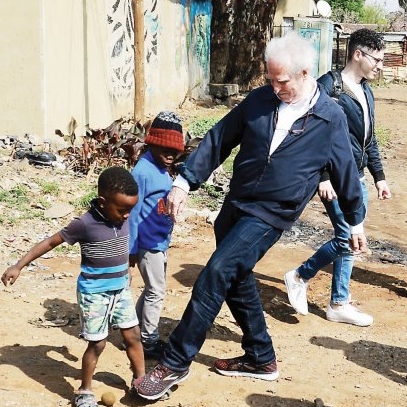click to dowload our latest edition
CLICK HERE TO SUBSCRIBE TO OUR NEWSLETTER


Published
5 years agoon
By
adminNICOLA MILTZ
Word got around that someone famous was in town, so the KGB (The Kliptown Gumbooters) donned their bright red overalls and gumboots for the American visitor in the hope of making some much-needed cash.
Their stage: a tiny backyard of a tin shack hugging the train tracks of Kliptown. The song chosen: Shosholoza, South Africa’s unofficial second national anthem, sung by miners to express the heartache, pain, and hardship of migrants on the mines. It was apt, considering the dire backdrop of this forgotten suburb.
After pelting it out in a lung-pounding throttle, the Einstein-like conductor (with silvery, wavy hair) looked up to the challenge that lay before him.
Zander, the conductor of the Boston Philharmonic Orchestra, beckoned the men, including their tiny mascot, Sifiso Pula, bedecked with his own pair of oversized gumboots, and said, “Watch me. Let’s try it again.”
Pulling their voices this way and that, stretching their sounds from high to low, the baton-less Zander transformed the melody by effortlessly controlling its interpretation and pace. Within a few seconds, a magical impromptu song brought more than a few tears to the eyes of the small crowd of onlookers that had gathered.
“If you give a little teaching, give a little nuance, it can bring tears to your eyes,” said Zander, seemingly wild-eyed with enthusiasm.
This is Zander: a leader, a conductor, a musical pied piper who works to create a certain kind of magic that countless students over the years have never thought remotely possible.
His religion is the “art of possibility”, and it’s also the title of his book co-authored with his wife, Rosamund Stone Zander.
“We all have it within us to be musical, it’s there, you just have to open yourself up to the possibility,” he said.
Zander is the recipient of this year’s Absa Jewish Achiever SAA Voyager Special and Extraordinary Award.
During his stay in South Africa, his sixth visit to the country, he saw a different side to Soweto than the usual touristy façade.
Accompanied by well-known photojournalist Ilan Ossendryver, the musical maestro was shown the real underbelly of township life.
Kliptown is a massive informal settlement, and is literally on the wrong side of the municipal tracks. Recently described by The Citizen newspaper as “a festering slum” and “a place history forgot”, it’s tucked away somewhere in the sprawling township of Soweto. Ironically, it’s the birthplace of South Africa’s most important historical document, the Freedom Charter.
The first thing to greet us was the smell of sewage and uncollected trash.
The second thing was the filth-encrusted, smiling faces of dozens of children who had also heard about the famous American.
A little boy on the corner of a ramshackle street café strummed on his homemade pair of drums, consisting of old Nan baby formula tins which he, no doubt, found on the massive rubbish heap around the corner.
“You see, there is music in all of us,” said Zander visibly moved.
Music followed the conductor to Kliptown Nursery School, where tiny children sang and danced. Stomping their feet, and moving their hips, they were told to impress, and they did.
Zander couldn’t help being touched by a tiny chipmunk of a girl singing from the movie Madagascar, “I like to move it, move it!”
He entered a game of street soccer with a group of boys using a threadbare, sewage-wet tennis ball. When one of them was splashed in the face, Zander used his crisp, white shirt to wipe the boy’s eyes, and then walked with him on his shoulders. The man is 80.
An elderly gentleman dressed in a silver suit carrying a birthday cake for his wife grinned with delight as Zander conducted “Happy birthday to you” in an impromptu street serenade.
It’s hard to believe that this is where the Freedom Charter was signed in 1955, said Zander after Ossendryver informed him of the place’s historical significance. Today, Kliptown is like an unflushed toilet, barely fit for human habitation, and an embarrassment for the likes of Johannesburg Mayor Herman Mashaba and Gauteng Premier David Makhura. It’s a place of illegal electrical connections, abject poverty, and rampant unemployment.
“My first reaction is to say how awful, how terrible, because there is such poverty,” said Zander, “But all I can focus on is the joy and love in the little children’s faces.
He said he had experienced more joy in this forsaken place with its vibrant street art and afternoon hustle and bustle than on leafy Brattle Street in Cambridge, Massachusetts, where he lives.
Zander went from Kliptown by minibus to the impressive Morris Isaacson Centre for Music, housed on the premises of the world-famous Morris Isaacson High School in Jabavu, Soweto. There, waiting for him, was an auditorium of music students fine-tuning their instruments.
Zander was presented with an untitled piece of music, which he had never seen before, that the students had been practising. They looked justifiably intimidated
It soon became apparent to him that they had a primitive understanding of the piece, so he calmly and gently squeezed the best out of them with his soft, lilting voice.
“How does the music make you feel?” he asked, “What do you think it’s about?” he probed.
He encouraged them to take their time, to practice, reminding them that it takes more than three minutes to perfect something.
Gradually he led them with infinite care, slowly taking them to a place where they would be able to take on the challenge.
Zander is an octogenarian with the energy of a man half his age.
“My role as a conductor is not to make a sound. My power is dependent on my ability to make other people powerful. My job is to awaken possibility in other people.”
